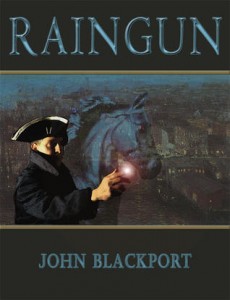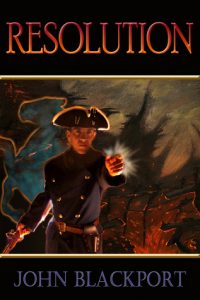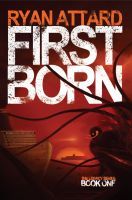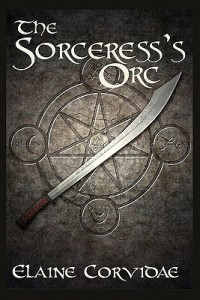Quite some time ago author, John Blackport, sent me an e-copy of Raingun for review. I finally managed to borrow a Nook to read it on. Though, doing so didn’t do much to further my side of the Kindle vs Nook battle that continues to rage between my husband and I. Oh well, it was worth it.
 Description from Goodreads:
Description from Goodreads:
Rick Rivoire is flush with money, women, and prospects. He protects his country as one of the Rainguns, an elite regiment of spellcasting cavalry.
But national policy drifts ominously into slavery and religious persecution, sparking rebellion. Joining the rebels could land Rick on a prison ship, in slave-irons — or atop the same gallows where he watched his father hang.
The alternative looks no brighter. The status quo imperils Rick’s hard-won self-respect. Supporting tyranny would doom his dream to emulate the valiant swordswoman who braved a den of monsters to rescue the lonely, terrified nine-year-old boy he once was.
Rick can’t stay above the fray forever. He must either defend a government whose actions disgust him — or risk everything he has to chase justice.
This story unfolds in a world of bloodthirsty pirates, brave musketeers, and vile monsters. Its target audience is anyone who has ever wrestled with questions of whether, and how, to risk opposing the actions of their country
Review:
I’ve had this book on my to-read list for a long time and was finally able to get around to reading it. I’m glad I did. I kind of fell a little in love with Rick Rivoire. I’m a sucker for an honourable man. I admit it, and Rick just tries so darned hard to be just and fair in his actions. He may resent the hell out of his mother, but she obviously raised him right. Though, how is a bit of a mystery. He is a lad though. He and his friends tease each other mercilessly, often at the expense of any female (whore or otherwise) in the vicinity. But then to pretend a 25-year-old soldier, alone among is fellow cavalrymen would be anything else would risk a singular lack of realism. Lets face it, not dying, food, drink and women almost certainly feature highly in the bunkhouse of any army anywhere in this world or the next. Plus, the camaraderie between him and his cadre (especially Kristoph) is just plain funny.
The book throws you right into the action and it can be a little discombobulating. There is a glossary and some explanatory information (geography, government, pantheon, etc) at the end and I would recommend reading this first. I did not do this, but would probably have been better off if I had. There is a lot to this world…I think 12 different gods/goddesses, each with a complex religious faction of their own, two nations (not including the elves), a full aristocracy, and then all of the military ranks. Then there is the currency, geography, spell casting, and monsters. Phew, it’s a lot to keep up with. I imagine this is going to be a long series. It just doesn’t seem like it would be worth setting all of it up unless it is.
There are a number of flashbacks in the beginning, addressing pivotal points in Rick’s childhood. This goes a long way toward explaining the man he becomes, but it also made the beginning of the book feel choppy. I spent a lot of time trying to catch up. 4 or 5 chapters in they taper off and the story takes on a more linear gate and reads a lot more smoothly. The writing itself has a fairly distinct cadence. There were times it felt forced, but in the end I decided that it would more accurate to say that it was used to create atmosphere. So, even if a sentence appeared a little convoluted it matched the character.
Rick spends A LOT of time in battle. The body’s ability to be resurrected multiple times and for spell casters to heal soldiers on the battlefield means he and his unit are able to be stabbed, slashed, burnt, shot and beaten over and over and over again. And they are. It’s not that it is horrendously graphic. The book isn’t, but he is a soldier during war time. The Raingun basically progress from one battle to another. This movement from field to field, enemy to enemy is actually what moved the book along. With each new altercation comes a little more information about what is happening politically in the country and another hint about what might be happening to/for/around Rick. A lot of this mystery isn’t cleared up by the end of the book. That there is civil unrest on the horizon is pretty clear, as are the reasons and players but what part Rick is to play, and he is obviously going to play a part, isn’t.
Raingun makes for an interesting contribution to the fantasy genre…I would have read it just so I could keep referring to Military Mages. It’s fun to say. I have the sequel, Resolution, which I plan to read too.
 Description from Goodreads:
Description from Goodreads:
Rick Rivoire used to love the army.
But now he and three other Rainguns are assigned to guard a Duke’s mining camp. The cruelty of the Baron against the workers is sickening. Rick’s long dreamed of rebellion. Perhaps now is the time!
However, Rick finds he can sometimes influence the Baron toward leniency. Is rebellion truly the best course against an authority that listens to reason?
Then the camp is attacked by Lucan, an ambitious necromancer eager to turn the defenseless slaves into undead minions. Rick’s duty commands him to delay the chaos of rebellion, until he sees Lucan crushed.
Rick must aid other forces come to fight Lucan: kind but brutish ogres, led by humans in war paint with tomahawks. How can he gain their trust?
In a town under siege, he meets the endearing Anya. Is she as innocent as she appears? Or is she a dangerous pawn?
Review:
Resolution finds Rick and his friends (though mostly Rick) defending a mine and the slaves who work it from the ever-increasing number of undead. I think that fans of the TV show The Walking Dead would love this book. It’s essentially a zombie story, though not touted as such.
Like in the first book Rick tries very hard to maintain his ethical and moral certitude in the face of increasingly questionable circumstances. He is confronted with a Baron who both perpetrates incredible cruelties and surprising acts of caring. He is a grey character. He firmly believes himself to be doing right, while others (Rick among them) are disgusted by his harsh punishments and befuddled by his occasional heroism. Rick is also forced to examine the actions of his own culture/government, questioning his willingness to continue to support decisions that he finds morally reprehensible. Slavery is becoming more widespread and permanent; dying no longer frees one of the subservience to a master. Certain religions are being suppressed and outlawed and all the while the followers of the gods of darkness seem to being growing more prevalent if not powerful. Oh and they seem to have it out for Rick in particular.
What I like about Rick is his introspection. He regularly examines his own thoughts and actions. Though not always pleased with what he finds, he isn’t afraid to see himself for what he is. I did miss his friends though. In theory they were assigned to the camp with him, but they play a very small part in the book.
There are a few unexplained aspects to the book. For example, apparently counting plays some part in the use of the Raingun’s magic. I noticed this mentioned in the first book too, but there never is any real explanation of why it is necessary. Magic also has to be replenished, but I never firmly understood how or why. It’s not that I can’t simply suspend enough disbelief to just accept these facts. This is a book of fantasy after all. But so much of the world is so meticulously laid out those aspects that aren’t stand out.
Also like the first book this one ends with mystery still afoot, mostly those which involve Rick. There were more hints that there is more going on around him than he realises, but still no resolution. As I sit here deciding whether or not to race out and get book three I can’t help but wonder how far into the series I’ll have to go before I start to get those answers. I wouldn’t really consider this too grievous an issue except that there aren’t yet anymore than three books, so I would be left waiting. hmmm

